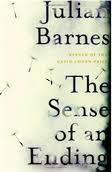 2011 has been topped and tailed by two very similar short novels, both by experienced master-craftsmen, both looking back on events of the protagonist's youth which weren't fully understood at the time, both written with a taut, spare economy and barely a word out of place.
2011 has been topped and tailed by two very similar short novels, both by experienced master-craftsmen, both looking back on events of the protagonist's youth which weren't fully understood at the time, both written with a taut, spare economy and barely a word out of place.Philip Roth's Nemesis was a simpler piece of story-telling; Julian Barnes' The Sense of an Ending is an altogether more ambitious work. Within its slight frame it dissects the unstable nature of history. As Adrian Finn says, quoting Lagrange, "History is that certainty produced at the point where the imperfections of memory meet the inadequacies of documentation." Barnes' book is an exploration of this thesis.
Tony Webster and his friends Colin and Alex are ordinary schoolboys in the sixties, intellectually curious and hung-up on girls. They are joined at school by Adrian Finn, whose intellectual fire-power immediately marks him out as Scholarship material. Tony looks up to Adrian, as do both his friends and the Masters at his school.
When Tony goes to Bristol University he starts to go out with Veronica, his first girlfriend, He is taken to meet her parents and their solid middle-class self-confidence immediately makes him feel inferior. It turns out that Veronica's brother is at Cambridge with Adrian, and after Tony and Veronica split up he gets a letter from Adrian requesting his permission to go out with Veronica.Tony's reply has unexpected consequences.
Fast-forward to today, and Tony is surprised to receive a bequest from Veronica's mother on her death. Veronica has some documents which have been left to him but which she is reluctant to release, so he tries to track her down in order to understand what happened when she split from him - yet his memory is unreliable and he is shocked to discover the picture of his younger self which emerges.
Barnes' characterisation has the precision of a stiletto. Tony is not naturally reflective, he is selfish, complacent, stolid and insensitive, yet cannot see it. He has caused damage that he cannot start to contemplate, but despite everything thinks he is an inoffensive nonentity. Veronica tries to penetrate his shell, but her pain is too great. The mystery is Adrian - to what extent does his theory of individual responsibility mean that he is unable to ascribe blame where it is due?
This is not a large book - only 150 pages - but its themes are massive. It does not feel slight, but rather it is as fully satisfying a read as many much larger novels - in fact, any further development would only detract from its key themes. Just as in Philip Roth's Nemesis, the sparsity engenders an emotional intensity and focus on a theme that would be lost in a bigger book. Both these master-craftsmen have the experience to know exactly when less is more.



